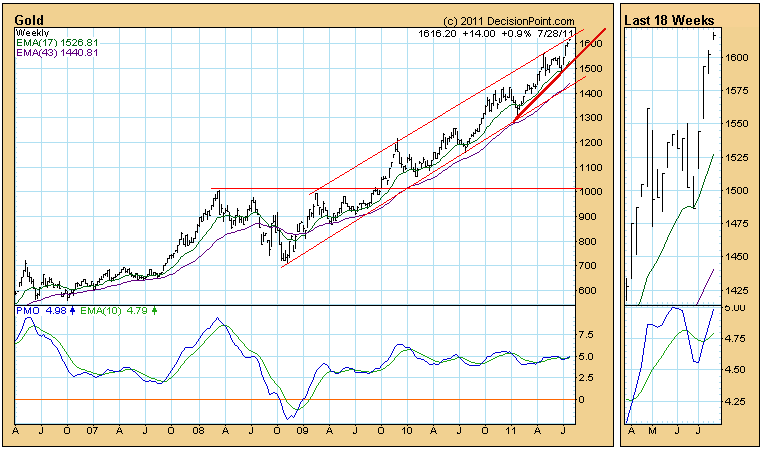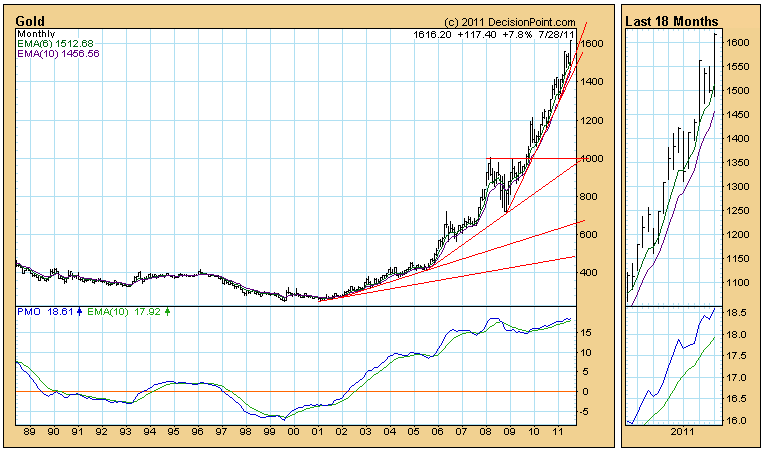07/29/2011
Is Gold A Sure Thing?
by Carl Swenlin
With global politicians (and a great many of their constituents) unable to come to grips with impossible levels of debt and spending, it seems that gold is an easy and certain way to hedge against the disaster that seems unavoidable. The logic seems perfect, and it is reinforced many times daily by ads on radio and TV. While I happen to think that gold looks like a really good solution to insuring against the danger, I always worry when something seems like a "sure thing." Let's take a look at some charts and then consider alternate scenarios.
The weekly chart shows that gold has been making new, all-time highs on a regular basis. it has been in a rising trend channel since 2009, and a steeper trend line has been established since the beginning of this year, which combined with the top of the trend channel gives us a rising wedge pattern. The wedge suggests that a move to the bottom of the trend channel may be coming.

The monthly chart offers another perspective regarding the 2011 rising trend line. It suggests to me that prices may be in the process of setting a more accelerated rate of ascent in an advance that is already parabolic.

The charts look positive and likely to stay that way, so what could go wrong with this picture? Well, the government could confiscate your gold. They have done it before, and they could do it again. But I am really more interested in challenging the assumption that the ultimate result of all that global debt will be hyperinflation.
There are plenty of examples of individual countries where the result of stupid fiscal/monetary policy has resulted in hyperinflation, but these examples take place in the context of a global economy that is, shall we say, relatively stable. The question I have is what will happen when global economies start collapsing like dominoes? Will deflation become a problem, rather than hyperinflation? I don't know the answer to that question, and considering the general consensus on this subject, it will probably be looked upon as a stupid question. But I think it is something to consider.
Bottom Line: Gold looks solid now, and it seems painfully obvious that gold is on track to reach much higher prices, perhaps inconceivably higher prices, but the future doesn't always turn out in the obvious way, and a global financial meltdown will affect things in ways that most people have not thought of. While I personally have a large percentage of my assets in gold, every time I consider going 100% into gold I remember that there is no such thing as a sure thing.
* * * * * * * * * * * * * * * * * * * * *
SUBSCRIBER QUESTION: Hello. I love the website and blog, but lately the mechanical model is not working with this type of market, last week you declared a breakout and this week the market is negative again. I think that when politics dominate the market mood the model is less reliable, it is not a criticism, but the situation is changing so often there have been a lot of false signals this year, maybe you should adopt a longer term view.
ANSWER: Believe me, we share your frustration at times like these, but any trading/timing methodology will not work 100% of the time. There will be losses and there will be drawdowns, but we aim for a rational, consistent approach that will perform well over time. Let's take a look at our performance as of the end of 2010 as tracked by timer Digest. (All timers and the benchmark index are assigned a starting TD Index of 100 at the beginning of the year. The amount above or below the starting index indicates the percentage gain or loss for the year.)
2010 TIMER DIGEST RANKINGS FOR DECISION POINT
#16 Intermediate-Term Stocks (52-Weeks) (TD Index 105.07 Vs. SPX 112.78)
#6 Intermediate-Term Stocks (3 Years) (TD Index 152.31 Vs. SPX 85.65)
#7 Intermediate-Term Stocks (5 Years) (TD Index 156.44 Vs. SPX 100.75)
#10 Intermediate-Term Stocks (10 Years) (TD Index 135.84 Vs. SPX 95.26)
#26 Long-Term Timer (2 Years) Stocks (TD Index 91.9 Vs. SPX 139.23)
#8 Long-Term Timer (3 Years) Stocks (TD Index 124.30 Vs. SPX 85.65)
#4 Long-Term Timer (5 Years) Stocks (TD Index 146.21 Vs. SPX 100.75)
#4 Long-Term Timer (10 Years) Stocks (TD Index 177.64 Vs. SPX 95.26)
As you can see, 2010 was an unusually bad year for our intermediate-term (52-week) and long-term (2-year) timing. But if you look at the longer periods shown, you can see we have a very good record that is consistent over time. As usual, past performance does not guarantee future results.
As for politics dominating the market, just remember "it's always somethin'." Our models are focused solely on price, and nothing else. Whatever is going on in the world is reflected in prices. Our timing models aim at a specific time frame and respond to price movement in a predetermined way. The models are not always correct, but they usually stick with the longer-term trend and limit losses/drawdowns.
Recently we have begun to experience whipsaw signals, which I believe are associated with long-term topping activity. I recommend that you read the documentation on the models so that you have an understanding of why a signal changes. This would allow you to use discretion as to how you should respond to any signal.
* * * * * * * * * * * * * * * * * * * * *
Technical analysis is a windsock, not a crystal ball.

* * * * * * * * * * * * * * * * * * * * *
Carl BIO: Carl Swenlin is a self-taught technical analyst, who has been involved in market analysis since 1981. A pioneer in the creation of online technical resources, he is president and founder of DecisionPoint.com, a premier technical analysis website specializing in stock market indicators, charting, and focused research reports. Mr. Swenlin is a Member of the Market Technicians Association.
 The monthly chart offers another perspective regarding the 2011 rising trend line. It suggests to me that prices may be in the process of setting a more accelerated rate of ascent in an advance that is already parabolic.
The monthly chart offers another perspective regarding the 2011 rising trend line. It suggests to me that prices may be in the process of setting a more accelerated rate of ascent in an advance that is already parabolic.
 The charts look positive and likely to stay that way, so what could go wrong with this picture? Well, the government could confiscate your gold. They have done it before, and they could do it again. But I am really more interested in challenging the assumption that the ultimate result of all that global debt will be hyperinflation.
There are plenty of examples of individual countries where the result of stupid fiscal/monetary policy has resulted in hyperinflation, but these examples take place in the context of a global economy that is, shall we say, relatively stable. The question I have is what will happen when global economies start collapsing like dominoes? Will deflation become a problem, rather than hyperinflation? I don't know the answer to that question, and considering the general consensus on this subject, it will probably be looked upon as a stupid question. But I think it is something to consider.
Bottom Line: Gold looks solid now, and it seems painfully obvious that gold is on track to reach much higher prices, perhaps inconceivably higher prices, but the future doesn't always turn out in the obvious way, and a global financial meltdown will affect things in ways that most people have not thought of. While I personally have a large percentage of my assets in gold, every time I consider going 100% into gold I remember that there is no such thing as a sure thing.
* * * * * * * * * * * * * * * * * * * * *
SUBSCRIBER QUESTION: Hello. I love the website and blog, but lately the mechanical model is not working with this type of market, last week you declared a breakout and this week the market is negative again. I think that when politics dominate the market mood the model is less reliable, it is not a criticism, but the situation is changing so often there have been a lot of false signals this year, maybe you should adopt a longer term view.
ANSWER: Believe me, we share your frustration at times like these, but any trading/timing methodology will not work 100% of the time. There will be losses and there will be drawdowns, but we aim for a rational, consistent approach that will perform well over time. Let's take a look at our performance as of the end of 2010 as tracked by timer Digest. (All timers and the benchmark index are assigned a starting TD Index of 100 at the beginning of the year. The amount above or below the starting index indicates the percentage gain or loss for the year.)
2010 TIMER DIGEST RANKINGS FOR DECISION POINT
#16 Intermediate-Term Stocks (52-Weeks) (TD Index 105.07 Vs. SPX 112.78)
#6 Intermediate-Term Stocks (3 Years) (TD Index 152.31 Vs. SPX 85.65)
#7 Intermediate-Term Stocks (5 Years) (TD Index 156.44 Vs. SPX 100.75)
#10 Intermediate-Term Stocks (10 Years) (TD Index 135.84 Vs. SPX 95.26)
#26 Long-Term Timer (2 Years) Stocks (TD Index 91.9 Vs. SPX 139.23)
#8 Long-Term Timer (3 Years) Stocks (TD Index 124.30 Vs. SPX 85.65)
#4 Long-Term Timer (5 Years) Stocks (TD Index 146.21 Vs. SPX 100.75)
#4 Long-Term Timer (10 Years) Stocks (TD Index 177.64 Vs. SPX 95.26)
As you can see, 2010 was an unusually bad year for our intermediate-term (52-week) and long-term (2-year) timing. But if you look at the longer periods shown, you can see we have a very good record that is consistent over time. As usual, past performance does not guarantee future results.
As for politics dominating the market, just remember "it's always somethin'." Our models are focused solely on price, and nothing else. Whatever is going on in the world is reflected in prices. Our timing models aim at a specific time frame and respond to price movement in a predetermined way. The models are not always correct, but they usually stick with the longer-term trend and limit losses/drawdowns.
Recently we have begun to experience whipsaw signals, which I believe are associated with long-term topping activity. I recommend that you read the documentation on the models so that you have an understanding of why a signal changes. This would allow you to use discretion as to how you should respond to any signal.
* * * * * * * * * * * * * * * * * * * * *
Technical analysis is a windsock, not a crystal ball.
The charts look positive and likely to stay that way, so what could go wrong with this picture? Well, the government could confiscate your gold. They have done it before, and they could do it again. But I am really more interested in challenging the assumption that the ultimate result of all that global debt will be hyperinflation.
There are plenty of examples of individual countries where the result of stupid fiscal/monetary policy has resulted in hyperinflation, but these examples take place in the context of a global economy that is, shall we say, relatively stable. The question I have is what will happen when global economies start collapsing like dominoes? Will deflation become a problem, rather than hyperinflation? I don't know the answer to that question, and considering the general consensus on this subject, it will probably be looked upon as a stupid question. But I think it is something to consider.
Bottom Line: Gold looks solid now, and it seems painfully obvious that gold is on track to reach much higher prices, perhaps inconceivably higher prices, but the future doesn't always turn out in the obvious way, and a global financial meltdown will affect things in ways that most people have not thought of. While I personally have a large percentage of my assets in gold, every time I consider going 100% into gold I remember that there is no such thing as a sure thing.
* * * * * * * * * * * * * * * * * * * * *
SUBSCRIBER QUESTION: Hello. I love the website and blog, but lately the mechanical model is not working with this type of market, last week you declared a breakout and this week the market is negative again. I think that when politics dominate the market mood the model is less reliable, it is not a criticism, but the situation is changing so often there have been a lot of false signals this year, maybe you should adopt a longer term view.
ANSWER: Believe me, we share your frustration at times like these, but any trading/timing methodology will not work 100% of the time. There will be losses and there will be drawdowns, but we aim for a rational, consistent approach that will perform well over time. Let's take a look at our performance as of the end of 2010 as tracked by timer Digest. (All timers and the benchmark index are assigned a starting TD Index of 100 at the beginning of the year. The amount above or below the starting index indicates the percentage gain or loss for the year.)
2010 TIMER DIGEST RANKINGS FOR DECISION POINT
#16 Intermediate-Term Stocks (52-Weeks) (TD Index 105.07 Vs. SPX 112.78)
#6 Intermediate-Term Stocks (3 Years) (TD Index 152.31 Vs. SPX 85.65)
#7 Intermediate-Term Stocks (5 Years) (TD Index 156.44 Vs. SPX 100.75)
#10 Intermediate-Term Stocks (10 Years) (TD Index 135.84 Vs. SPX 95.26)
#26 Long-Term Timer (2 Years) Stocks (TD Index 91.9 Vs. SPX 139.23)
#8 Long-Term Timer (3 Years) Stocks (TD Index 124.30 Vs. SPX 85.65)
#4 Long-Term Timer (5 Years) Stocks (TD Index 146.21 Vs. SPX 100.75)
#4 Long-Term Timer (10 Years) Stocks (TD Index 177.64 Vs. SPX 95.26)
As you can see, 2010 was an unusually bad year for our intermediate-term (52-week) and long-term (2-year) timing. But if you look at the longer periods shown, you can see we have a very good record that is consistent over time. As usual, past performance does not guarantee future results.
As for politics dominating the market, just remember "it's always somethin'." Our models are focused solely on price, and nothing else. Whatever is going on in the world is reflected in prices. Our timing models aim at a specific time frame and respond to price movement in a predetermined way. The models are not always correct, but they usually stick with the longer-term trend and limit losses/drawdowns.
Recently we have begun to experience whipsaw signals, which I believe are associated with long-term topping activity. I recommend that you read the documentation on the models so that you have an understanding of why a signal changes. This would allow you to use discretion as to how you should respond to any signal.
* * * * * * * * * * * * * * * * * * * * *
Technical analysis is a windsock, not a crystal ball.
 * * * * * * * * * * * * * * * * * * * * *
Carl BIO: Carl Swenlin is a self-taught technical analyst, who has been involved in market analysis since 1981. A pioneer in the creation of online technical resources, he is president and founder of DecisionPoint.com, a premier technical analysis website specializing in stock market indicators, charting, and focused research reports. Mr. Swenlin is a Member of the Market Technicians Association.
* * * * * * * * * * * * * * * * * * * * *
Carl BIO: Carl Swenlin is a self-taught technical analyst, who has been involved in market analysis since 1981. A pioneer in the creation of online technical resources, he is president and founder of DecisionPoint.com, a premier technical analysis website specializing in stock market indicators, charting, and focused research reports. Mr. Swenlin is a Member of the Market Technicians Association.












